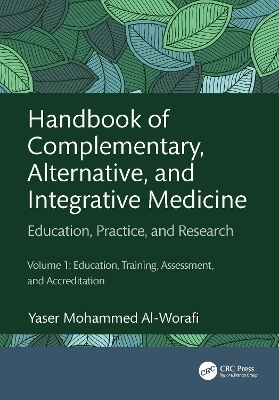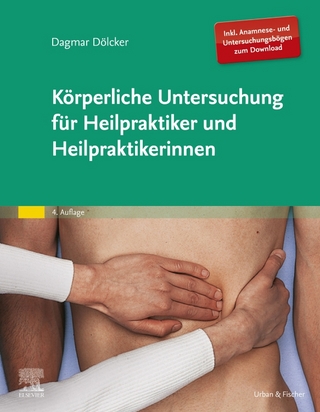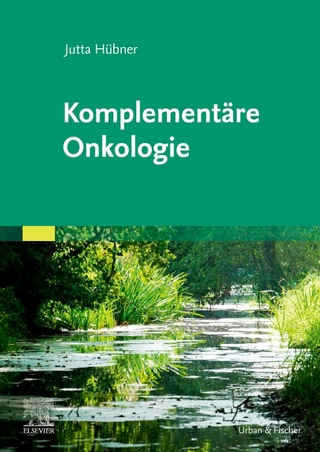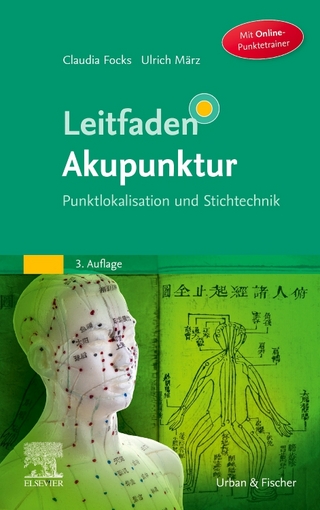
Handbook of Complementary, Alternative, and Integrative Medicine
CRC Press (Verlag)
978-1-032-34682-3 (ISBN)
Volume 1 focuses on complementary, alternative, and integrative medicine (CAM) education. Its 20 chapters cover CAM education history, needed competencies, and curriculum reform, among other topics. It is Volume 1 of 6 that describe the education, practice and research related issues and the efficacy and safety of CAM in treating various conditions. The purpose of these six volumes (sold individually or as a set) is to explain how complementary, alternative, and integrative medicine is practiced around the world; to share the best practice/experiences in terms of education, practice and research; and identify the challenges and suggest recommendations to overcome the identified challenges.
Key Features:
Addresses worldwide issues of education, training, assessment, and accreditation in complementary and alternative medicine
Deals with such hot topics as access/equitable access, online education, and quality and accreditation
Serves as part of a six-volume comprehensive treatment of complementary, alternative, and integrative medicine as practiced around the world
Prof. Yaser Mohammed Al-Worafi is a Professor of Clinical Pharmacy at College of Pharmacy, University of Science and Technology of Fujairah, UAE (Previously known as Ajman University) and University of Science and Technology, Yemen. He graduated with a bachelor's degree in Pharmacy (BPharm) from Sana’a University, Yemen and earned his Master's and PhD degrees in Clinical Pharmacy from the Universiti Sains Malaysia (USM), Malaysia. Prof. Yaser has many postgraduate program certificates including Training to Teach in Medicine 2023 from Harvard Medical School, Harvard University; Contemporary Approaches to University Teaching from The Council of Australasian University Leaders in Learning and Teaching (CAULLT). He has more than 20 years of experiences in education, practice, and research in Yemen, Saudi Arabia, United Arab Emirates and Malaysia. He has held various academic and professional positions including: Head of Clinical Pharmacy/Pharmacy Practice department; Head of Teaching & Learning Committee, Head of Training Committee, Head of the Curriculum Committee and other committees. He has authored over 100 peer-reviewed papers in international journals, editing/authoring more than 30 books and 800 book chapters by Springer, Elsevier, Taylor & Francis, USA. Prof.Yaser has supervised/co-supervised many PhD, Master's, PharmD and B-Pharm students. He is a reviewer for eight recognized international peer-reviewed journals. Prof. Yaser taught, prepared, designed and wrote many pharmacy programs for many universities including the Master of Clinical Pharmacy/Pharmacy Practice program; PharmD program, and BPharm program; internship/clerkships for Master's, PharmD and BPharm programs; more than 30 courses related to Clinical Pharmacy, Pharmacy Practice, Social Pharmacy and Patient Care.
Chapter 1. History of Complementary and Alternative Medicine (CAM) Education
Chapter 2. Competencies in Complementary and Alternative Medicine (CAM) Education
Chapter 3. Curriculum and Curriculum Reform in Complementary and Alternative Medicine (CAM) Programs
Chapter 4. Complementary and Alternative Medicine (CAM) Education: Admission Criteria & Requirements
Chapter 5. Complementary and Alternative Medicine (CAM) Education: Teaching Strategies
Chapter 6. Complementary and Alternative Medicine (CAM) Education: Assessment & Evaluation Methods
Chapter 7. Complementary and Alternative Medicine (CAM) Education: Online Education
Chapter 8. Complementary and Alternative Medicine (CAM) Education: Training
Chapter 9. Complementary and Alternative Medicine (CAM) Education: Quality and Accreditation
Chapter 10. Complementary and Alternative Medicine (CAM) Education: Access/Equitable Access
Chapter 11. Complementary and Alternative Medicine (CAM) Education: Continuous Medical Education
Chapter 12. Complementary and Alternative Medicine (CAM) Education: Cost of Education and Training
Chapter 13. Trends in Research & Graduation Projects in Complementary and Alternative Medicine (CAM)
Chapter 14. Technology in Complementary and Alternative Medicine (CAM) Education
Chapter 15. Community Services by Complementary and Alternative Medicine (CAM) schools/Departments
Chapter 16. Complementary and Alternative Medicine (CAM) Education: Library and education resources
Chapter 17. Complementary and Alternative Medicine (CAM) Education: Interprofessional Education
Chapter 18. Health Care Professionals, Students and Patients/public Perspectives on Complementary and Alternative Medicine (CAM) Education and Training
Chapter 19. Complementary and Alternative Medicine (CAM) Education: Achievements, Challenges.
Chapter 20. Future of Complementary and Alternative Medicine (CAM) Education.
| Erscheinungsdatum | 30.08.2024 |
|---|---|
| Verlagsort | London |
| Sprache | englisch |
| Maße | 178 x 254 mm |
| Gewicht | 802 g |
| Themenwelt | Sachbuch/Ratgeber ► Gesundheit / Leben / Psychologie ► Alternative Heilverfahren |
| Medizin / Pharmazie ► Allgemeines / Lexika | |
| Medizin / Pharmazie ► Naturheilkunde | |
| Medizin / Pharmazie ► Studium | |
| ISBN-10 | 1-032-34682-5 / 1032346825 |
| ISBN-13 | 978-1-032-34682-3 / 9781032346823 |
| Zustand | Neuware |
| Informationen gemäß Produktsicherheitsverordnung (GPSR) | |
| Haben Sie eine Frage zum Produkt? |
aus dem Bereich


